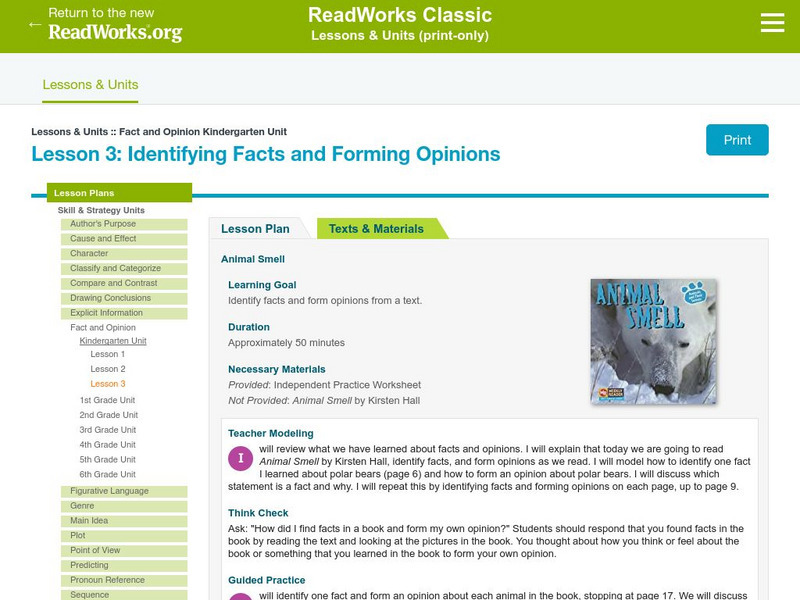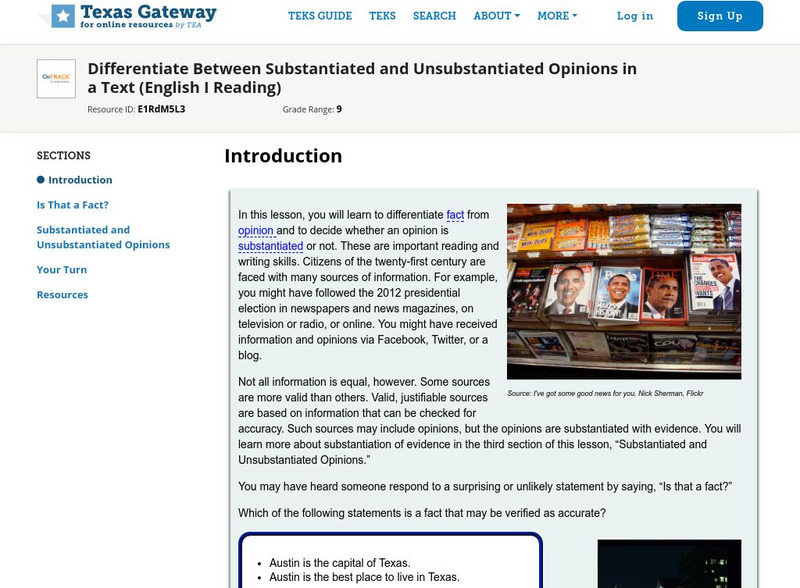Hi, what do you want to do?
Curated OER
Acting Out as we Go
Fourth graders use motor imaging to remember the definitions of words. In this vocabulary lesson, 4th graders work in groups to make a pantomime to help them remember a word. Students document the experience in their notebooks.
Curated OER
Worksheet for Analysis of a Newspaper Article
In this primary source analysis worksheet, students respond to 20 short answer questions that require them to analyze their selected newspaper articles.
Curated OER
Which Animals Should Be Saved?
Fifth graders investigate the concepts related to the endangerment of different animal species. They conduct research using a variety of resources. The skills of prediction are used to show the possible outcome of the extinction of a...
Curated OER
Frederick Douglass: This is Your Life; The Abolitionist
Seventh graders study the abolitionist movement in antebellum America.
Curated OER
Independent - To Be or Not Top Be - Day 2, Lesson D: Intestinal Fortitude
Fifth graders explore intestinal fortitude in terms of their oral presentation.
Curated OER
Independent - To Be or Not Top Be - Day 2, Lesson C: Freedom of Speech
Fifth graders explore the following questions: What is it? What is it like? What is an example?
Curated OER
Creative Writing
Eleventh graders write a persuasive letter to the editor using the writing process.
Curated OER
Scavenger Hunt
Students search for items in various parts of the newspaper noting the different types of information it provides.
Curated OER
African-American Heroes
Students explore websites about famous African-Americans. They work in pairs to decide on an African American who should be honored with a stamp. They write a letter recommending this person for a stamp including appropriate reason why...
Texas Education Agency
Texas Gateway: Analyze Literary Essays' Inclusion of Personal Opinions and Facts
In this lesson, you will learn how to identify and discuss the use of facts, personal examples, and ideas and how they are woven into a literary essay.
Texas Education Agency
Texas Gateway: Differentiate Substantiated and Unsubstantiated Opinions in Text
[Accessible by TX Educators. Free Registration/Login Required] In this lesson, students will learn to differentiate fact from opinion and to decide whether an opinion is substantiated or not.
Read Works
Read Works: Lessons: Lesson 3: Identifying Facts and Forming Opinions
[Free Registration/Login Required] A lesson plan and materials to teach kindergarten students identify facts and form opinions using the book Animal Smell.
Polk Brothers Foundation Center for Urban Education at DePaul University
Depaul University: Center for Urban Education: Classify Facts and Opinions [Pdf]
Students will find three lessons about facts and opinions in this learning module. The following topics are linked in the module: contrast and evaluate fact and opinion; classify facts and opinions; and locate and classify facts.
University of South Florida
Fcat Express: Teaching Strategies (Reading) [Pdf]
Printable, fifty-five page PDF file of a staff development manual containing strategies for teaching reading. Includes chapters on vocabulary, main ideas and supporting details, author's purpose, chronological order, plot and conflict...
Texas Education Agency
Texas Gateway: Differentiate Between Substantiated and Unsubstantiated Opinions
[Accessible by TX Educators. Free Registration/Login Required] In this lesson, you will learn to differentiate fact from opinion and to decide whether an opinion is substantiated or not. These are important reading and writing skills.
E Reading Worksheets
E Reading Worksheets: Reading Activities
An assortment of reading mini-projects are included on this site. Reading skills worksheets and differentiated reading activities are also included.
Sophia Learning
Sophia: Critical Reading as a Learning Strategy
This tutorial focuses on critical reading using a downloadable PowerPoint presentation, "Critical Reading 101," which includes separating fact from opinion, 6 propaganda techniques, and 6 common fallacies in reasoning. Also provided is...
E Reading Worksheets
E Reading Worksheets: Fact and Opinion Lessons
In this learning module, students will learn more about the differences between facts and opinions. A PowerPoint presentation and related activity are provided to reinforce the topic of facts vs. opinions. This module is designed to...
E Reading Worksheets
E Reading Worksheets: Fact and Opinion Worksheets
Fact and opinion practice exercises, answer sheets, and explanation summaries are included on this tutorial site. Worksheets are tiered in levels of difficulty.
Read Works
Read Works: Grade 2: Two Lesson Unit: Fact and Opinion
[Free Registration/Login Required] Designed to teach students to identify fact and opinion in a text. Lessons are based on the text "Dear Diary" and the book Penguins by Lynn M. Stone. Includes ideas for direct teaching, guided practice,...
Sam Houston State University
Sam Houston State University: Fact and Opinion Ii Post Test
Students choose the fact and opinion statements in four multiple choice questions and then read two short texts and answer two multiple choice questions about facts and opinions presented in each. Answers are available when exercise is...
Scholastic
Scholastic: Test Skill Builders for Reading: Making Judgments [Pdf]
Standardized test practice for students in grades 5 and 6. Students read a practice passage and answer questions that require them to make judgments about such things as fact or opinion and the author's purpose. Answers to the practice...
Florida Center for Reading Research
Florida Center for Reading Research: Text Analysis: Fact or Opinion Game [Pdf]
A lesson plan in which students play a game where they move around a board by determining if statements are facts or opinions. Materials are included.
Florida Center for Reading Research
Florida Center for Reading Research: Text Analysis: Matter of Fact or Opinion [Pdf]
A lesson plan in which young scholars work with a partner to write facts and opinions on different word cards. Materials are included.

















![Depaul University: Center for Urban Education: Classify Facts and Opinions [Pdf] Unit Plan Depaul University: Center for Urban Education: Classify Facts and Opinions [Pdf] Unit Plan](https://content.lessonplanet.com/knovation/original/119988-719af6c927af61affa025c27754c7fae.jpg?1661787067)




![Scholastic: Test Skill Builders for Reading: Making Judgments [Pdf] Unit Plan Scholastic: Test Skill Builders for Reading: Making Judgments [Pdf] Unit Plan](https://content.lessonplanet.com/knovation/original/480321-6f12644c5ef0c583c0ed15abcd563c89.jpg?1661251115)
![Florida Center for Reading Research: Text Analysis: Fact or Opinion Game [Pdf] Lesson Plan Florida Center for Reading Research: Text Analysis: Fact or Opinion Game [Pdf] Lesson Plan](https://content.lessonplanet.com/knovation/original/509095-73da26d30a9eaa9b2f5c24d21663aace.jpg?1661786981)
![Florida Center for Reading Research: Text Analysis: Matter of Fact or Opinion [Pdf] Lesson Plan Florida Center for Reading Research: Text Analysis: Matter of Fact or Opinion [Pdf] Lesson Plan](https://content.lessonplanet.com/knovation/original/509093-adc405a5910df5a982823c4579441be2.jpg?1661786984)